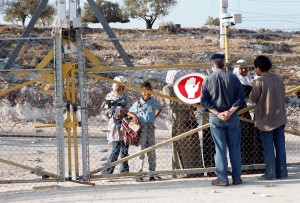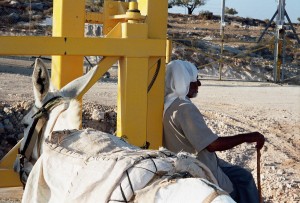In Palestine last year I began a faith journey of learning to share powerlessness.
I served as a volunteer for the Ecumenical Accompaniment Program in Palestine and Israel from the end of August until the end of November 2003. The World Council of Churches’ program was launched in response to an invitation by the churches in Jerusalem to journey with them on the road to peace. Ecumenical accompaniers, as volunteers in the program are called, work for three months with Palestinians and Israelis. I joined 19 accompaniers from Canada, Denmark, Norway, Sweden, Switzerland, United Kingdom, and the United States. We were placed in Israeli and Palestinian communities and organizations to live with them and share their lives in the state of a low-level war.
I lived with two clergy persons, a Norwegian and an American, in a Palestinian farming village called Jayyous on the border between Israel and the Occupied Territories, sharing the reality of living with the separation barrier. The barrier, constructed by Israel in the Occupied Territories to control the movement of Palestinians, is a concrete wall in some places and a wire fence in others. The fence in Jayyous created an immense difficulty for the villagers because it separated them from their fields, greenhouses, orchards, and olive groves-their livelihoods. There were two gates that, in theory, enabled farmers to go to work. Children also went to school through the gate. But the openings were irregular, and every day created an explosive atmosphere between the farmers and the soldiers who controlled the gates.
We went to work in the field with the farmers and shared the difficulty created by the barrier and the occupation. We also took turns watching the gate openings so that the peace would be kept between farmers and soldiers. The gate watch was also a human rights watch.
In Jesus, God became human, became powerless like us. Therein was Christ’s power, a “power of powerlessness” as Dietrich Bonhoeffer put it. In the mission of the church, are we not also sent into the world to share powerlessness?
Yet I know first-hand that sharing powerlessness is not easy. One day, we waited for  two hours for soldiers to open the gate. Children were already late for school and the day was getting shorter for harvesting. Olives, the villagers’ main crop, as precious as gold, were overripe and drying up on the trees. Mohamed, one of the farmers, looked at me and my cell phone and demanded, “Call jesh (soldier in Arabic).” He didn’t know that I had no access to the Israeli military. I felt badly for being so powerless. I felt I was betraying my friends. As far as he was concerned, foreigners were supposed to fix things that needed fixing. Throughout recent history, we Europeans and North Americans have accepted proudly the role of the designated fixer-uppers of the world. So we feel badly when we cannot fix what needs fixing. In other words, we don’t know how to share powerlessness, because we think we are blessed with power and know-how to fix things for others. In the meantime, we confess that God only is almighty, yet God became human and lived among us. How does this belief fit in with our self-designated role?
two hours for soldiers to open the gate. Children were already late for school and the day was getting shorter for harvesting. Olives, the villagers’ main crop, as precious as gold, were overripe and drying up on the trees. Mohamed, one of the farmers, looked at me and my cell phone and demanded, “Call jesh (soldier in Arabic).” He didn’t know that I had no access to the Israeli military. I felt badly for being so powerless. I felt I was betraying my friends. As far as he was concerned, foreigners were supposed to fix things that needed fixing. Throughout recent history, we Europeans and North Americans have accepted proudly the role of the designated fixer-uppers of the world. So we feel badly when we cannot fix what needs fixing. In other words, we don’t know how to share powerlessness, because we think we are blessed with power and know-how to fix things for others. In the meantime, we confess that God only is almighty, yet God became human and lived among us. How does this belief fit in with our self-designated role?
The sun was high and scorching hot and the situation looked hopeless. Another day lost and the crop ruined. Women bunched together and started to cry. Louise, a visiting Danish journalist and an accompanier, joined the women and cried with them. Hearing this, a British volunteer of a solidarity organization said, “That must have been the most healing thing that happened to those women, sharing tears.” But men don’t cry. I wished we could.
What hinders us from sharing powerlessness is our passports and technology. Maren, another accompanier and a medical student, was riding an ambulance with a Palestinian colleague. She flashed her passport at the checkpoint, and the soldier just waved them on. She was proud that she could help in an emergency. But her Palestinian colleague said, “I wanted you to see the difficulty and delay we face every day when it is only us (Palestinians) in the ambulance.”
On another day, the soldiers were late again. So I phoned HAMOKED to find out what’s the problem. HAMOKED is an Israeli human rights organization that keeps up-to-date information about checkpoints and gates to help Palestinians cope with difficulties they may have to face in the course of their daily work. The representative at HAMOKED said, “I will call you back as soon as I find out what the problem is.” A second later, an Israeli jeep pulled up and the gate was opened. It was a coincidence. Abdul Karim, a man on a donkey, gave me a thumbs-up and said, “Thanks, you did it again.” “No, I didn’t,” I told him. It was a pure coincidence. But he didn’t hear me. A foreigner did his magic bit, again.
The people of Jayyous were incredibly gracious to us. I had heard about Palestinian hospitality but their kindness surpassed all imagination. But towards the end of my stay, I began to notice that this was not always the case with some older men and women. They were never rude, but kept a respectful distance from us. I can still picture this old man who always came with a donkey cart, dressed in a traditional kaffiyeh head cover and a worn-out dress jacket. He always sat silently on a boulder near the gate and patiently waited for the soldiers. I tried to engage him in conversation a few times sitting next to him. But he ignored me as though I wasn’t there. I could feel his embarrassment. Why could he not go to his olive trees, handed down from generation to generation for centuries, without help? Why did he have to depend on the foreigners?
I saw the same humiliated eyes in a soup kitchen in Montreal. While many seemed to have given up, some looked disdainful. I saw the same eyes in the feeding camps in Ethiopia in 1985. The Ethiopians were proud farmers. They arrived, near death and starving, because they stayed home too long trying everything, in the end selling all possessions, to feed the family on their own. They were still proud but defeated, looking humiliated. Am I reading too much into their stoicism? I don’t think so. Why? Because I know the humiliation of having to depend on other people’s charity.
It was in 1945 in Japan. We were all dying of starvation because the war totally destroyed the country’s infrastructure. I was desperately hungry and Americans gave us food. Was I grateful? I should have been. But the only thing I remember is an overwhelming feeling of humiliation. Sincere appreciation occurs in the relationship of equals. This is why unaffected giving and receiving are difficult among strangers. We have to be friends, brothers and sisters, first.
I am not saying that we should not help others. Jesus fed thousands, healed the sick, drove out demons, and raised the dead. But the central message of the gospel is that God came to be like us and lived among us in Jesus. His healing act was a spontaneous reaction of one human to another in the community of love. It was an act of solidarity, not an intervention.
I think about the violent history of the Middle East and the role played by the West. I now realize that there has been too much imposition and not enough solidarity. There has been too much tit-for-tat of violence that benefited foreign powers. Violence always begets more violence.
Let us not go to the trouble spots of the world and impose our solution any more. Let us first share the powerlessness of the suffering people. That is the Christ’s way.

